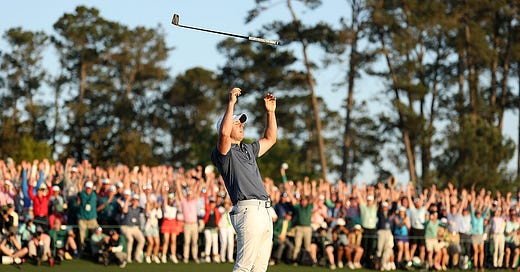Rory joins exclusive club, the hard way
The Waratahs' swim as McKenzie founders, the Warriors outdo Vitas Gerulaitis, a rogue cycling story makes The Bounce and Fast Eddie makes mockery of Olympic selectors
Sometimes you want something so badly it causes involuntary muscle spasms and a scrambled mind…
… and that was just Rory McIlroy’s legions of fans who were watching on TV.
Imagine how the man himself must have been feeling as he flirted with Disaster and all manner of other temptresses during an inconceivably dramatic US Masters final round.
The Northern Irishman is one of the most popular players on tour — although those who don’t like him tend to really not like him — but he’s become something of a tragic figure1 as his search for a fifth major stretched into the 11th year. After winning the PGA Championship at Valhalla in 2014, McIlroy has notched up 21 top 10s in majors, including four runner-up finishes, without lifting the silverware.
Some of those near misses have been devastating, like when he bogeyed three of the last four holes at the US Open at Pinehurst last year to let Bryson DeChambeau steal in for the win. Perhaps in a bid to block that collapse from his memory card, he apparently did not utter a word to the Californian as they were paired together in the final round today.
The Masters was McIlroy’s white whale. It was the major he needed for a career grand slam and the weight of that showed itself more than once. How else do you explain him flicking an 80-metre chip into the creek protecting the par-five 13th green? It was the sort of shot that would have caused some mirth among his playing partners had it been hit by an 18 handicapper at Takapuna, let alone one of the greatest to have ever played.
If he had gone on to lose the playoff with Justin Rose, that shot would have gone down in golfing infamy, like Phil Mickelson’s tee shot on the 18th at Winged Foot in 2006 when he chased his first US Open, the only one of the four majors he hadn’t claimed (and still hasn’t).
Instead the 35 year old displayed the sort of resilience he’s often criticised for not showing enough of, climbing back from his fourth double bogey of the week to stand over a short-ish putt on the 18th to win it in regulation.
Yeah, he missed it.
He wouldn’t make the same mistake when he got another chance in the first playoff hole.
The boy from Holywood finally gets his Hollywood ending, wrote Oliver Brown in the Telegraph ($):
The reaction, when it finally came for Rory McIlroy, was a convulsion, a sense of catharsis so overwhelming that it left him physically heaving. His face puce and his body shaking, he was so spent by the time he holed his four-foot birdie putt at the 18th for a first Green Jacket that he crumpled to the ground.
For so long tormented here at Augusta [McIlroy] expiated the curse in thrilling, bewildering, stomach-churning style, completing the full set of golf’s greatest prizes by rallying from every improbable setback.
Truly, this was sport at its most monumental.
Resilience feels inadequate as a description. This was sporting courage at its finest, a definitive rebuke to the idea that McIlroy could never overcome his fragility in sight of the finishing line.
Golf has a long history. Across those years, only six men — Jack Nicklaus, Tiger Woods, Ben Hogan, Gary Player, Gene Sarazen and McIlroy — have won all four majors, and only 20 others can match or better his five majors.
Few, if any, would have put their fans through such a white-knuckle ride to get there.
If you missed it, here’s a good way to catch up. McIlroy’s multiple oscillations between the inexplicable and the impossibly good are wild.
With the Lions soon to hit town, the Australian rugby revival could not be better timed.
Sure, the Chiefs were bizarrely ineffective across the park and Damian McKenzie had the sort of game that he’ll have to work hard to wipe from his hard drive, but the Waratahs were really good and scored one of the all timers.
They’re getting all sorts of column inches in their local paper and website, the Sydney Morning Herald (see final item for a counterpoint), and at one point you could distinctly hear the crowd chanting “NSW, NSW”, which isn’t particularly imaginative but it must have sounded particularly earwormy to rugby bosses watching their sport emerge from from some long, dark shadows.
That try, wow.
The Waratahs’ try in the 44th minute, scored by Teddy Wilson, will be replayed for years. After defending their own line, the ball popped out and Wilson passed the ball across to Andrew Kellaway in his in-goal.
The Tahs winger then set off up field and found Joseph-Aukuso Sua’ali’i in support, who also ran upfield before passing inside to Creighton. The NSW number 10 pulled off an incredible overhead tap-on to Kellaway again, who found Wilson for the try. With a curved path, the total distance was an estimated 120 metres.
Historically, the Waratahs would be among my least favourite rugby teams, but it was hard to begrudge them success on the weekend.
While McKenzie had a Barry Crocker, a rival for the All Black No 10 jersey is having a little purple patch (though not necessarily off the kicking tee).
Beauden Barrett is not the only Blues playmaker turning heads. Here’s Suzanne McFadden on Blues fullback Braxton Sorensen-McGee, who starred in the Aupiki final, won by the Blues 26-19 over Matatū.
Keep reading with a 7-day free trial
Subscribe to The Bounce to keep reading this post and get 7 days of free access to the full post archives.




